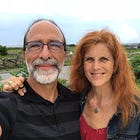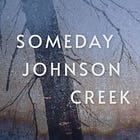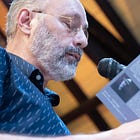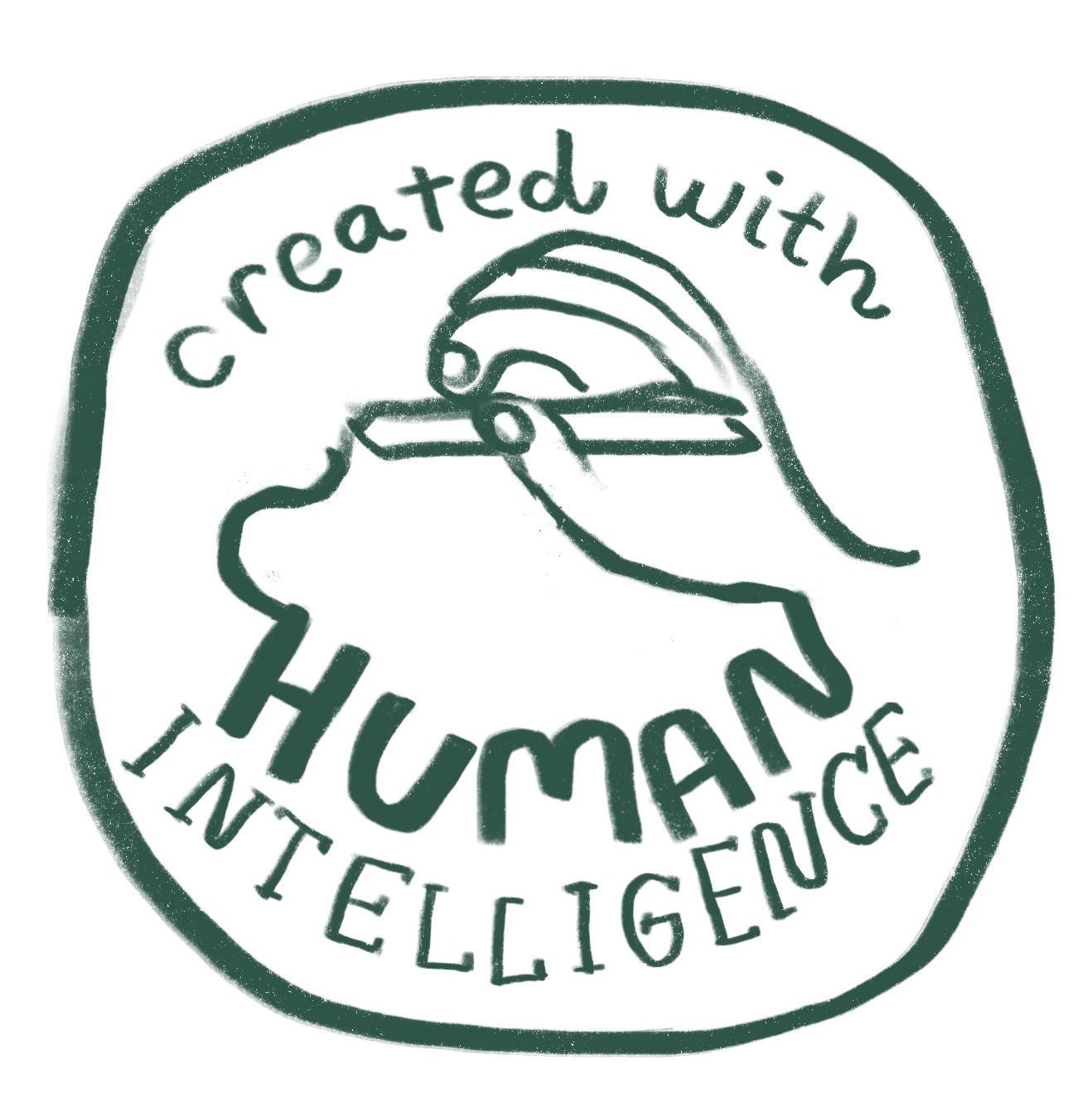Exploring Life through the Written Word
Dear Friends,
I am always on the lookout for interesting individuals. They fascinate me. In particular, the varied ways they live their lives and the myriad thoughts that pass through their minds. I am intrigued by what makes them tick. And how they think. The uniqueness of the individual is quite spectacular. I have yet to encounter an uninteresting individual.
is one of those interesting individuals I encountered lately. I recommend checking out his work. If I were you, I would start here:Another individual I find endlessly fascinating is
. He writes Echoes from an Old Hollow Tree where he shares essays on nature, family, and tradition. His recent essay hit home for me as I continue to seek ways to push back against the ever-encroaching realm of tech.There is a word that describes the human response to music — a word for “that moment” when a song pierces your body and soul. It’s called “frisson.”
recently shared an article with a playlist talking about what it feels like to be alive.“No need to hurry. No need to sparkle. No need to be anybody but oneself.” - Virginia Woolf
Thanks to Ed from
for the photo of a young man on the rocks. I thought it captured the idea of an individual human set against the enormity of nature.The Interview Series:
I have been interviewing other readers and writers for over a year. It has become one of my favorite parts of this publication. Here are the interviews I have done previously. Keep your eye out for more interviews in the coming months.
Personal Reading:
Dead Man’s Walk by Larry McMurtry - I came to this book with considerable anticipation. Having fallen under the spell of Gus McCrae and Woodrow Call through McMurtry's Lonesome Dove years earlier, I was hungry for more time with them in their younger days. The opening pages promised what I hoped for—the same lyrical prose, deep character insight, and authentic frontier atmosphere that made the original novel so compelling, but with the added dimension of watching legendary figures in their formative years. McMurtry delivered on every promise those first chapters made. The book reveals how the men we knew became who they were, showcasing the experiences that shaped their friendship, their diverse approaches to leadership, and their understanding of the brutal realities of frontier life. The emotional architecture was carefully constructed around the tension between youthful ambition and harsh reality, as Woodrow and Gus learn that the romanticized version of adventure rarely survives contact with actual hardship. I was impressed with McMurtry's ability to maintain the epic scope and emotional depth of Lonesome Dove while creating a completely different kind of story. This wasn't just a prequel trading on familiar characters—it was a fully realized exploration of how young men test themselves against an unforgiving landscape and discover both their capabilities and their limitations. I recommend this book for anyone who appreciated Lonesome Dove and wants to understand these characters more deeply, as well as readers who enjoy historical fiction that doesn't romanticize the past but instead examines it with clear-eyed honesty. McMurtry accomplished something remarkable here: creating a worthy companion to one of the great American novels while telling a story that stands powerfully on its own merits.
Chancy by Louis L’Amour - I read this as part of my systematic journey through L'Amour's complete works, expecting the familiar rhythms of frontier justice and personal redemption that define his best writing. The book delivered what I expected—a man facing impossible odds with nothing but determination and hard-won wisdom to see him through. L'Amour's craft remained consistent here, creating that particular blend of action and introspection that made his heroes feel authentic rather than mythic. The book succeeded by grounding its adventure elements in genuine human stakes, demonstrating how survival often depends more on character than on circumstances. Chancy will likely appeal to L'Amour enthusiasts seeking another solid entry in his canon and readers who appreciate Westerns that focus on personal growth through adversity. The book delivers a satisfying story of resilience and moral clarity set against the unforgiving backdrop of the American frontier.
Polk: The Man Who Transformed the Presidency and America by Walter Borneman (You can see the complete list of books I am reading as part of my Presidential biography project here: Matthew’s Reading Projects) - I read this as part of my project to read through presidential biographies in chronological order, approaching James K. Polk with the curiosity that comes from encountering a figure often overlooked despite his consequential presidency. The author offers a reassessment of a president whose single term fundamentally reshaped the nation's geography and executive power. The book methodically builds the case for Polk's historical significance, demonstrating how his focused agenda and relentless execution transformed the presidency and America itself. Borneman's craft lay in his ability to make the mechanics of 19th-century politics accessible while maintaining scholarly rigor. The emotional architecture was built around the tension between Polk's remarkable achievements and the personal cost of his driven nature. Borneman revealed the modern presidency emerging through Polk's assertive use of executive power, making connections between his administration and contemporary political dynamics that felt genuinely illuminating rather than forced. Readers interested in presidential history, particularly those curious about how the office evolved beyond its early constraints, will find value in this book. Borneman rehabilitates Polk's reputation while acknowledging the moral complexities of his expansionist legacy. For anyone systematically exploring presidential history, this provides solid, if unremarkable, insight into a pivotal but underappreciated presidency.
The Well-Educated Mind by Susan Wise Bauer - During a period of questioning my own reading habits, I was drawn to Bauer's promise of a systematic approach to engaging with great literature beyond the constraints of formal education. The book delivers practical guidance and intellectual permission—a framework for approaching challenging texts with confidence rather than intimidation. Bauer's craft lay in demystifying the reading process itself, breaking down how to engage actively with different genres from fiction to philosophy. The book treats readers as capable adults who simply need tools rather than extensive background knowledge. Her approach feels refreshingly democratic, assuming intelligence while providing practical scaffolding. I agree with Bauer's insistence that reading great books isn't about cultural performance but genuine engagement with ideas that shape human thought. The emotional architecture is built around empowerment—the growing confidence that comes from developing systematic reading skills. The Well-Educated Mind is valuable for anyone seeking to move beyond passive consumption toward active intellectual engagement with literature. Bauer accomplished something significant: creating a bridge between academic literary study and personal intellectual development, demonstrating that rigorous reading can be accessible and transformative.
Leviathan Falls by James S. A. Corey - In this final volume, I expected Corey to somehow bring satisfying closure to the vast, complex narrative they'd constructed across The Expanse series. What I found was an ending and a transformation—not just resolution but a fundamental shift in how we understand the universe these characters inhabit. Corey delivered on that ambitious promise, crafting a conclusion that honored the series' scientific rigor while embracing the cosmic mystery that had always lurked at its edges. The emotional architecture was built around loss and transcendence, showing how endings can be devastating and necessary. I recommend Leviathan Falls for series devotees seeking a thoughtful conclusion and readers who appreciate science fiction that grapples with genuinely profound questions about consciousness and existence. Corey accomplished the difficult task of ending an epic saga while maintaining the intellectual and emotional integrity that made the journey worthwhile.
Zachary Taylor by John S.D. Eisenhower. This book chronicles the journey of America's 12th president, from his early military career on the frontier to his unexpected rise to the presidency. Known as "Old Rough and Ready," Taylor earned fame as a general in the Mexican-American War before reluctantly entering politics. Eisenhower portrays a man of simple habits and strong convictions who, despite limited political experience, navigated the growing tensions over slavery with surprising independence. Taylor's brief 16-month presidency ended with his sudden death in 1850, leaving behind questions about how he might have shaped the nation's destiny during this critical period in American history. Recommended for readers interested in U.S. History.
Circe by Madeline Miller. The minor goddess Circe from Homer's Odyssey is transformed into the protagonist in this lyrical retelling of Greek mythology. Banished to the island of Aeaea for her defiance, Circe discovers her power of witchcraft and learns to navigate a world dominated by gods and mortals alike. Miller weaves together familiar myths—from the Minotaur to Odysseus's journey—through Circe's perspective, exploring power, transformation, and what it means to be human. The novel reimagines the classical tales, giving voice to a character who was once merely an obstacle in a hero's journey. I listened to the audiobook version and found it to be an interesting companion piece to my reading of Homer’s works this year.
Comanche Moon by Larry McMurtry. Chronologically, this is the third book in the Lonesome Dove series, following the earlier adventures of Texas Rangers Augustus McCrae and Woodrow Call. Set in the 1850s and 1860s, the novel follows the Rangers as they confront Comanche raids, Mexican bandits, and the changing frontier landscape. McMurtry weaves together multiple storylines involving frontier families, Native American conflicts, and the complex relationships that defined the American West. The book provides crucial backstory for characters familiar from Lonesome Dove while standing alone as an epic of survival, friendship, and the brutal realities of frontier life in pre-Civil War Texas. I read Lonesome Dove years ago and also watched the mini-series on TV. I decided to revisit this beloved classic by reading all four books in chronological order.
Deep Work: Rules for Focused Success in a Distracted World by Cal Newport. Newport argues that the ability to focus intensely on cognitively demanding tasks—what he calls "deep work"—has become increasingly rare and valuable in our hyperconnected economy. Drawing on research from psychology and neuroscience, he demonstrates how constant connectivity and shallow work habits undermine our capacity for meaningful productivity. The book offers practical strategies for cultivating focus, including time-blocking, digital minimalism, and creating distraction-free environments. Newport presents compelling case studies of high achievers who prioritize deep work, arguing that those who can concentrate without distraction will thrive professionally while others struggle with busy work and fragmented attention. I chose to read this as part of my self-education program to help me develop methods to avoid distraction and go deeper in my reading and personal studies.
Robots and Empire by Isaac Asimov. This book is a crucial bridge between his Robot and Foundation series, set 200 years after his earlier robot novels. The story follows detective Elijah Baley's descendants as they investigate mysterious deaths on the Spacer world of Solaria, while robots Daneel and Giskard grapple with evolving interpretations of the Three Laws of Robotics. As Earth faces an environmental crisis and humanity's expansion into the galaxy hangs in the balance, Asimov weaves together themes of artificial intelligence, human destiny, and social evolution. The novel introduces the pivotal Zeroth Law and sets the stage for the galactic empire that dominates his later Foundation series.
The Currents of Space by Isaac Asimov. The first book in his Galactic Empire series, focusing on the agricultural world of Florina and its sole export: kyrt, a precious fiber essential to the galaxy's economy. When a psychologist discovers a catastrophic threat to Florina's sun, political intrigue unfolds as the ruling planet Sark seeks to suppress this knowledge to protect their economic interests. The novel explores exploitation, environmental destruction, and social inequality through the lens of interplanetary politics. Asimov combines hard science fiction concepts with a thriller-like plot, examining how economic dependence can be used as a tool of oppression across civilizations.
*You can click on the title of any book to purchase your own copy. These are affiliate links, earning me a very small commission for any purchase you make.
Video:
For those following along with the Homer read-along this will be particularly enjoyable I think. However, I encourage everyone to give it a watch. It is a full-length movie and done in a style you are perhaps not familiar with. However, it is a testament to the amazing ingenuity and creativity of the human mind. Thank you to
for sharing this with me.
If you are interested:
Matthew’s Lifetime Reading Log - Clicking on that takes you to a Google spreadsheet that contains my entire reading history since 1997. There is also a tab for my “To Be Read” (TBR) list and a couple of tabs for reading projects. This remains a work in progress.
Beyond the Bookshelf is a reader-supported publication. If you've found value in my work and it has helped, informed, or entertained you, I'd be grateful if you'd consider leaving a tip. Your support helps me continue creating content and means more than you know. Even small contributions make a real difference and allow me to keep sharing my work with you. Thank you for reading and for any support you're able to offer.
Until next time,



















Did you also read Song of Achilles by Madeline Miller, Matthew?
Love this quote: “No need to hurry. No need to sparkle. No need to be anybody but oneself.” - Virginia Woolf
Reminds me of our unique Blueprint.
-Jenks